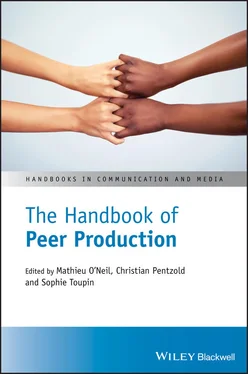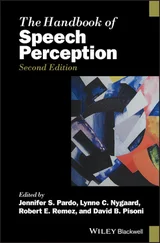In sum, Bourdieu’s concepts of field, semi‐autonomy, and symbolic capital help us to see common threads in (1) how peer production projects are situated within a larger context of cultural production (where for example open source communities provide alternatives to proprietary computing software), (2) how this positioning within a larger field can be seen as enacting a kind of semi‐autonomy, meaning these projects demonstrate some capacity to resist pressures from other fields and in particular market and state power, and (3) how such semi‐autonomy is related to the establishment and protection of core values, of which many are related to the process by which projects are governed, (4) how symbolic capital, or field‐ and project‐specific reputation, is accrued through demonstrating commitment to these core values and is intertwined with formal and informal hierarchies within peer production projects. In the next two sections, I discuss two overarching values that typify peer production: meritocratic rule and openness. Importantly, these values relate to the processes of collaboration and governance rather than the end products.
Although peer production projects are generally open to participation by anyone, there are certainly hierarchical tendencies within them and with this comes forms of closure and exclusion. On the one hand, there are formal hierarchies – project leaders, maintainers, committees, Wikipedia editors, and so on, and these various positions entail different rights and privileges. In Wikipedia’s case, for example, the user class “bots” has more rights than anonymous users, reminding us that such large‐scale peer production also requires socio‐technical forms of government (Niederer & van Dijck, 2010). Proponents of peer production argue that these hierarchies are flexible arrangements that serve a larger goal of ensuring equal participation, rather than serving to sustain themselves (Bauwens, 2005). On the other hand, there are informal hierarchies that can be understood as accumulations of symbolic capital – think for example of a Wikipedia admin who holds particular esteem and is deferred to by other editors and admins. In idealized form, these hierarchies in peer production arise from merit as opposed to credentials , meaning there is no prior separation of experts and non‐experts, qualified persons and unqualified persons. Instead, the aim is that individuals earn their position through demonstrations of their ability and commitment to the project. In practice, both Wikipedia and open source communities display strong beliefs in the importance of rewarding people based on individual merit, and in the possibility of a functioning meritocratic system. I emphasize that the belief also relates to the possibility of meritocracy because this is a contentious position to hold. Before moving to critiques of the belief in meritocracy in peer production and related online communities, however, this section first develops the concept of meritocracy in peer production further.
The desire for a meritocratic form of hierarchy, in which individual talent and dedication is rewarded accordingly, is linked to a broader commitment to the political philosophy of liberalism. As Coleman (who uses the term “hackers” to refer to the collective identity of open source software makers) explains, hackers working on open source projects display a commitment to liberalism in the sense of:
historical as well as present‐day moral and political commitments and sensibilities that should be familiar to most readers: protecting property and civil liberties, promoting individual autonomy and tolerance, securing a free press, ruling through limited government and universal law, and preserving a commitment to equal opportunity and meritocracy.
(Coleman, 2013, p. 2)
This commitment to liberalism is not straightforward, but rather hackers enact a “liberal critique from within liberalism” (Coleman, 2013, p. 3). They critique a liberal belief in the value of intellectual property by promoting another liberal value, that of free speech. Hackers, in other words, critique proprietary software on the basis that it limits their “productive freedom,” or freedom to “autonomously improve on their peers’ work, refine their technical skills, and extend craftlike engineering traditions” (Coleman, 2013, p. 3).
How is meritocracy enacted? As Coleman argues, hackers’ commitment to meritocracy gives open source software production a contradictory character. On the one hand, hackers emphasize that individuals must “pull themselves up by their own bootstraps,” meaning they should apply themselves to learning their craft and earning any respect or rewards through long hours of dedication to programming and engineering. On the other hand, to create the conditions for this, hackers must provide not only the software they build and its source code, but also the documentation and explanation necessary for others to assess, evaluate, and learn from their work (Coleman, 2013). Beyond that, since the work of programming is often far more complex than implementing a well‐defined plan and involves a host of social and cultural competencies in addition to technical ones, hackers rely on each other for all kinds of knowledge that help them to do their jobs or contribute to open source projects. In other words, where meritocracy suggests self‐reliant, individual feats of technical skill, here it also implies providing the necessary resources that create the equal opportunity in which a meritocracy works.
Hacker culture, in particular in the online discussion spaces for discussing programming problems, reflects this contradictory emphasis on self‐reliance and helping others: on the one hand, the experienced programmers in these spaces can be notoriously hostile to beginners asking questions that have been answered numerous times before, leading to the response “RTFM” (“read the fucking manual”) and similar (Coleman, 2013, p. 107). On the other hand, the fact that these spaces exist and that so many programmers volunteer time to maintain them suggests programmers are fully aware of their reliance on the help of others and the need for this circle of support to remain (Coleman, 2013). Meanwhile, technically challenging questions invite a great number of responses, not just because they represent an intellectual challenge but also because it gives hackers an opportunity to demonstrate their skills and intelligence to an audience of peers.
To outsiders it may seem strange, but anyone who has spent time in open source communities or editing Wikipedia will know that humor plays an important role in peer production. Although such humor is significant for many reasons (including smoothing over conflicts or acting as a kind of “communal gift”), it has a specific relationship to the value of meritocracy (Coleman, 2013, p. 105). As Coleman points out, humor and craftiness in general allows hackers to draw attention to their technical competence in a socially acceptable way (Coleman, 2013). To write a script or piece of documentation that is funny to another expert coder, one has to play with form (conventions and corresponding expectations), and thus one must demonstrate a deep familiarity with the programming language, programming styles, algorithmic techniques, and general approaches to solving problems. Similarly, to make jokes that draw on or highlight Wikipedia’s complex set of policies and guidelines or key events from its history one must be steeped within them. In Bourdieu’s terminology, we could say that such clever software developers or Wikipedians are signaling their cultural capital , or command of the various skills, knowledge, and competences that will allow them to succeed within a particular field or project.
Читать дальше


![О Генри - Справочник Гименея [The Handbook of Hymen]](/books/407356/o-genri-spravochnik-gimeneya-the-handbook-of-hymen-thumb.webp)









